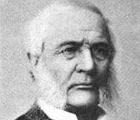Timber and Milling
Many of the treaties signed by the U.S. with Dakota and Ojibwe people focused on timber rights. The Ojibwe, and to a lesser extent the Dakota, controlled forests from which American businesses could make vast fortunes. So these business interests took an active role in treaty making. In fact, the first Ojibwe-US treaty in what is now Minnesota is popularly known as the "White Pine Treaty."
American timber fortunes extended beyond the companies that actually harvested the forests. "Boom companies" conveyed logs down river; logs were processed into lumber at huge saw mills (which eventually were transformed into flour mills); water power companies at St. Anthony Falls and elsewhere provided the energy for milling. All of these business interests were represented in treaty making.
The Ojibwe people were careful in treaties to retain timber rights whenever they could. They kept those ownership rights not only on reservation land, but on the land they ceded to the US. And despite the transfer of millions of acres of forest to the US, American businesses targeted the timber rights that Ojibwe and Dakota people retained in treaties. Treaty rights were ignored off-reservation. Fraudulent schemes involving some of the highest-ranking members of the U.S. Indian Affairs bureaucracy were created to harvest timber even on reservation land. (See “Annuities, Scrip and the Indian Trade”) Long legal battles have resulted in Supreme Court decisions that recognize the timber rights that Ojibwe people retained in treaties.
Significant players in timber-related industries (and their relatives) who signed treaties with Dakota and Ojibwe in what became Minnesota included:
- Reuben Carlton, who owned the Carlton Land, Mineral and Mining Company (see mining), signed one of the 1847 Ojibwe treaties.
- Robert Stuart of the American Fur Company purchased lumber businesses and saw mills, and signed four treaties with the Ojibwe including the 1842 treaty in Wisconsin.
- Charles Trowbridge of Detroit, treaty signer and brother-in-law of Henry Sibley, was partner in the Boston Company, a lumber manufacturer.
- Richard Chute controlled water power in Minneapolis and was also prominent in the fur trade and transportation. He signed the 1851 treaty with the Mdewakanton and Wahpekute Dakota, and the 1846 Ho-Chunk treaty.
- Hercules Dousman secured ownership of timber land, and forced the transfer of timber scrip from Ojibwe mixed blood people to his own companies.
- George Camp, a timber speculator and partner in the Rum and Mississippi Boom Company, signed the “Old Crossing” treaty with the Red Lake band of Ojibwe in 1863.
- Joel Bassett owned a large lumber mill in Minneapolis when he became Indian Agent for the Ojibwe. He eventually was convicted of fraudulently harvesting 17,000,000 feet of timber from White Earth Reservation. He became famous as the founder the Columbia Flour Company in Minneapolis. Bassett signed the 1867 Ojibwe treaty.










